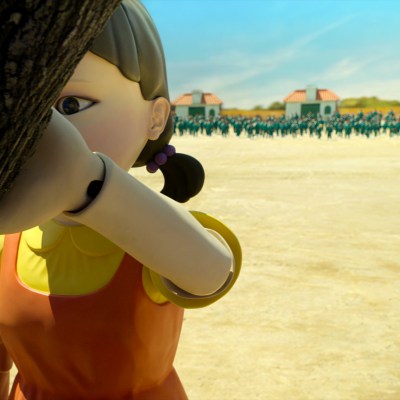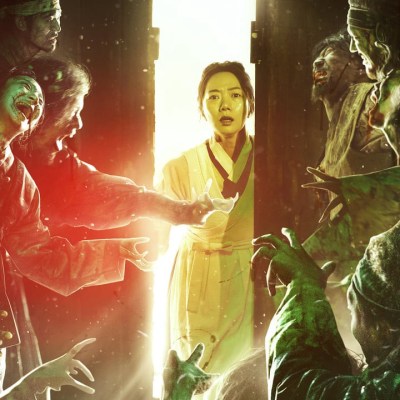Squid Game Ending Explained
This SQUID GAME article contains MAJOR spoilers.
For a series with a relatively well-worn premise, Netflix’s Squid Game sure does manage to pack a lot of surprises into its conclusion. It does this in large part by recognizing that the series’ success hinges not so much on who wins the game, but on how they win it and what it all means. Like the show’s beginning, much of Squid Game‘s final hour is set outside the world of the arena—this time, a year following the events of the bulk of the show. Let’s break down what happens in the Squid Game ending…
Who Wins Squid Game?
While the meat of Squid Game‘s conclusion comes outside of the game, the final round—Round Six, the series’ original title—is effective. In a callback to the series’ opening scene, which shows kids playing the titular “squid game” as Gi-hun explains the rules, the final two contestants must face off in the children’s game. It’s especially fitting (and depressing) that the final two contestants are Gi-hun and Cho Sang-woo, as the two grew up in the same town and used to play squid game together as kids. More than that, Sang-woo has been deemed a success by society (well, up until that embezzlement part) and Gi-Hun, a failure. By pitting these two against one another in Squid Game’s final contest, and making it very clear who the more humane human is, the series is calling into question the metrics by which we measure status and worth in our world.
As Squid Game progresses, the competition has become more and more encouraging of inter-contestant violence. This is especially true for the final round, in which Gi-hun and Sang-woo are allowed to use force to beat the other person—even to their death. It’s about winning the squid game or making it so your opponent can’t win the squid game… or anything else. It’s barbaric and raw and, for a moment, it seems like Gi-hun may succumb to the kind of desperate brutality that has claimed so many in this game.
After an ugly fight, Gi-hun manages to beat Sang-woo to the ground and make his way to the circle drawn in the sand that, should he step inside, would mean his victory and Sang-woo’s death. He almost does it, too—he is so angry with Sang-woo whom, over the course of the game, he has realized is willing to kill in order to secure his victory—but, in the end, human life is worth more to Gi-hun than any sum of money. It’s what Kang Sae-byeok reminded him of right before she died (at Sang-woo’s hand). We all have the capacity to do both good and terrible things. Gi-hun may have a good heart, but, more impressively, he is able to act with it.
This is exactly what Gi-hun does, realizing that he doesn’t have to choose money over human life. One of the three rules in the game allows for the competition to be canceled should a majority agree to end it. The group enacted it after the first round before deciding to re-instate the game shortly after. To the surprise of the VIPs watching from their gilded booth, Gi-hun walks back over to Sang-woo and asks him to leave with him. To end the game. Sang-woo seems to consider it, reaching out for Gi-hun outstretched hand, before he instead takes the dagger buried in the ground next to him and plunges it into his own neck.
Why does Sang-woo do it? Perhaps he is too ashamed of what he has done, both in the arena and outside of it. Or maybe he can’t stand to face his mother and others without the money. Perhaps he does the math and realizes, at this point, the only way to get the money to his mother is to make sure Gi-hun wins it and helps out the woman he’s known since he was a kid. Maybe he’s just tired and traumatized. Probably, it’s all of the above. Whatever the reason, Sang-woo kills himself and Gi-hun wins the game. In the end, though, I think it’s clear that no one actually wins Squid Game.
Who Dies in Squid Game?
It might be easier to list who doesn’t die. None of the game’s 456 contestants make it out, save for protagonist Gi-hun and old man contestant Oh Il-nam (more on that later). Ali is tricked by Sang-woo into giving all of his marbles in Round Four, and is killed by the soldiers. Han Mi-ryeo succeeds in her promise to kill gangster Jang Deok-su when she grabs onto him and throws them both off of the glass bridge in Round Five. Kang Sae-byeok, the North Korean woman looking to get back to her brother, is killed by Sang-woo in the lead up to the final round.
Notable deaths in the series conclusion that take place outside the arena include Hwang Joon-ho, the police officer who infiltrates Squid Game pretty damn effectively, only to be killed by the Front Man, aka his own brother. And also Gi-hun’s mother, whom Gi-hun finds dead upon returning to his apartment after winning the game. Presumably, she died from complications to her diabetes, which is shown to be very serious in the second episode.
Joon-ho’s Brother: Who is In-ho?
In the eighth episode of the season, “Front Man,” Hwang Joon-ho makes it off of the arena’s island with evidence of the game. He is hunted down by the game’s Front Man and his goons. Joon-ho tries to call for back-up and to send he evidence he has gathered to his police chief, but is unable to due to cell phone poor service. He is cornered on a high, rocky cliff and asked to surrender by the Front Man, who reveals himself to be Joon-ho’s own brother, In-ho.
In Episode 5, “A Fair World,” Joon-ho discovers that his brother was a previous winner of Squid Game—in 2015, five years prior. Somehow, In-ho went from being a winner to being a main controlling force—probably in no small part because, as we see from how Gi-hun responds to winning, it is not easy to get past the extreme trauma of Squid Game. In-ho is so committed to his role as the Front Man that he shoots his own brother, when Joon-ho refuses to surrender to him. Joon-ho, who spent the entire season gathering evidence of Squid Game, falls to the water below, presumably to his death and presumably with all of the evidence he has gathered.
Who Runs Squid Game?
This is a complicated question because we don’t truly understand the scope of Squid Game. When Joon-ho infiltrates the records vault underneath the Front Man’s rooms, he finds evidence of years and years of games like the one we have been watching play out. Discussion amongst the VIPs also suggests that the game is being played in different locations around the world—this could mean that multiple games are happening simultaneously or that they happen throughout the year in different locations. We know from the labels on the (honestly very well organized) records that there are multiple games every year.
Logistically, the Front Man runs the game with the help of the workers, soldiers, and managers—aka the dudes in red coveralls. In the final episode, Oh Il-nam, aka Contestant 001, is revealed to be the Host of the game, and implied to be if not the person who runs the entire gambit, then one of the people who is in charge. He gives more of the game’s backstory from his deathbed…
Why Did Oh Il-nam Play Squid Game?
We find out in Squid Game‘s final episode that Oh Il-nam, the older man Gi-hun befriended in the arena and whom we all thought died in the marbles round, actually survived the Squid Game. This is because he is one of its creators. He chose to play the game after years of watching it because he had been diagnosed with a brain tumor that caused him to reflect on his life. As he tells an understandably very angry Gi-hun from his death bed a year following their Squid Game, he wanted to feel like he did when he was a kid, playing with his friends and losing track of the hours.
This is pretty fucked up. To Il-nam, the game truly was a game: something to pass the time and make him feel alive when regular life wasn’t doing it for him. Of course, Il-nam wasn’t like any other player. When he lost to Gi-hun, he wasn’t killed. The Front Man may espouse the equality of the game, but it isn’t a fair competition—it’s rigged for the uber elite, just like the outside world. Il-nam’s survival proved that, if it wasn’t already obvious. His desperation wasn’t like the other player’s because he knew exactly what was going on and had an out, not only from the game but from the kinds of desperate situations that the other contestants found themselves in outside the arena.
When Il-nam is dying on Christmas Eve in the corner of a mostly barren office-tower floor, he tells Gi-hun that the very poor and the very rich are the same in that living is no fun for either. Somehow, Gi-hun doesn’t strangle him then and there. He also doesn’t strangle him when Il-nam reveals how Squid Game started: basically, Il-nam and his rich friends were bored and joyless, and decided to create the games as a way to have some fun. This legacy continues with the Squid Games of today, as demonstrated by the VIPs, a group of (seemingly mostly American) rich men who sip whiskey and tell jokes as they watch desperate people die in the game they bet on. To them, human life has lost all meaning, and, because they have an exorbitant amount of wealth (which is to say power), these are the rules others must also play by.
Gi-hun is extraordinary because he refuses to play by those rules. Il-nam tells him that he deserves the money, because that is the logic he and his ilk have lived under—as if anyone deserves the kind of immense privilege that must always be built on others’ exploitation and suffering—but Gi-hun refuses to spend it. Il-nam tells him that no one will stop for the man passed out on the side of the frozen road, and Gi-hun takes that bet. And he wins. What sets Squid Game apart from so many of the stories in this genre is its ability to balance the ruthlessness and injustice inherent in the premise with a stolid belief in the capacity for goodness. The system is rigged for people like Il-nam, who suffers no consequences for his actions. but there will always be people, like Gi-hun and the person who went to get the cops to help the man on the street, who care and who act on that caring.
No doubt this plot twist will be a divisive part of Squid Game discourse. Personally, I could have done without it. Gi-hun’s relationship with Il-nam is one of the best dynamics in the entire show, and one that underscores the series’ central theme of how important it is to value humanity, even when the system you live in does not. Episode 6, “Gganbu,” is the best hour of the entire season in no small part because of how Il-nam and Gi-hun’s contest to the apparent death plays out. To backtrack on that for a final-episode plot twist that doesn’t add much thematically to the story feels like a mistake. That being said, there is enough that works about this scene and episode for Squid Game to have an overall rewarding conclusion.
Gong Yoo’s Cameo: Why Does Gi-Hun Change His Mind?
Il-nam’s deathbed confession seems to kickstart Gi-hun’s life. He dyes his hair red like a K-pop idol. He finds Sae-byeok’s brother and leaves the boy (and half of his winnings) with Sang-woo’s mother. Though it seems like Gi-hun intends to return to them following a trip to visit his daughter, who has moved with her mother and stepfather to Los Angeles, this all changes when Gi-un sees something on the subway: the same man (played by Train to Busan‘s Gong Yoo) who recruited him for Squid Game is playing ddakji with a man. Gi-Hun abandons his luggage and dashes to the platform where Gong Yoo’s salesman character is working to recruit another desperate soul. Gong Yoo has already boarded a train by the time Gi-Hun makes it to him, smiling through the glass door. All Gi-hun can do is grab the Squid Game calling card from the latest recruit, and command him not to play the game.
Or is it all Gi-hun can do? When he is on the airbridge to board his plane to LA, he takes out the calling card and dials the number, telling the voice on the other side: “Listen carefully. I’m not a horse. I’m a person. That’s why I want to know who you people are, and how you can do these horrible things to people … It wasn’t a dream. I can’t forgive you for everything you’re doing.” Like the person who stopped to help the man on the street, Gi-hun refuses to accept the status quo, if there is anything at all he can do about it. He has wealth now and, rather than accepting complicity in a horrifying system as a condition of that power, he is risking it all. He is stopping for the man on the street.
The post Squid Game Ending Explained appeared first on Den of Geek.
From https://www.denofgeek.com/tv/squid-game-ending-explained/





